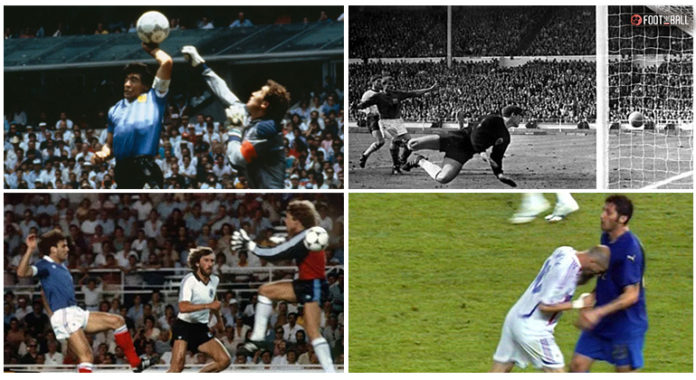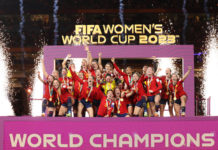If an event is held 21 times across 84 years, there is bound to be at least one controversy every time that event is held. We are, of course, talking about the FIFA World Cup. When the ball is kicked for the first time in Qatar, it will be more than nine decades since the first World Cup in 1930. It has been an incredible journey for the tournament, which has gone from strength to strength, becoming among the top-viewed tournaments in the world.
However, that incredible journey has also seen tough times that have left the game of football in a negative light. Some of these controversies have stood the test of time and are still vividly remembered by fans today, while others have been largely forgotten or don’t attract the same emotion they did when they occurred.
So, today, we dive into the top 10 controversies of the FIFA World Cup.
1982 World Cup France vs Kuwait, The disallowed goal
The 1982 World Cup was filled with so many controversies that this incident only got the third rank, with the top two controversies coming later in this article. Kuwait were playing in their second-ever FIFA World Cup and were handed a tough group which included Czechoslovakia, France and England. However, they started brilliantly with a 1-1 draw against Czechoslovakia and faced France in Estadio Jose Zorrilla, Valladolid.
The French showed their superior skills and raced to a 3-1 win. However, what came next became a part of World Cup history. France scored its fourth goal through Alain Giresse, but the goal was vehemently protested by Kuwaiti players who had stopped after hearing a whistle which they thought came from the Soviet referee Miroslav Stupar. However, the whistle had been blown by a fan in the stands. Sheikh Fahad Al-Ahmed Al-Jaber Al-Sabah, Kuwait’s prince and the President of the nation’s football association, ran on the pitch and forced Stupar to change his decision. France won the match 4-1 eventually. Kuwait lost their next game 1-0 in the final match, and Kuwait were sent home.
Kuwait vs France (82 World Cup) pic.twitter.com/Z8dlr4szBK
— Football Pics (@Footbal22315649) June 5, 2021
2006 World Cup Croatia vs Australia, The three yellow cards
Australia qualified for the 2006 FIFA World Cup after 32 years which was an excellent achievement for the nation. The Socceroos were drawn in Group F alongside five-team champions Brazil, Croatia and Japan. However, Croatia vs Australia match attracted the biggest attention as Croatian defender Josep Simunic got three yellow cards.
- Best player in the best tournament: The history of FIFA Golden Ball and its winners
The Croatian defender got his first caution in the 61st minute of the game. Then, in the 89th minute, Simunic received his second yellow card but was not sent off by referee Graham Poll. Four minutes later, he would receive his marching orders after receiving a third yellow card. The referee Graham Poll was the favourite referee for the World Cup Final. However, he was suspended in the middle of the World Cup.
No Poll, No Party.
English referee Graham Poll famously hands out 3 yellow cards to Croatia's Josep Simunic against Australia at the 2006 World Cup. 😅 pic.twitter.com/YbUmyEiyuA
— Classic Football Shirts (@classicshirts) November 6, 2022
2006 World Cup- Italy vs France Zinedine Zidane’s headbutt
Well, it might not be high among the top 10 controversies of the FIFA World Cup, but it is undoubtedly one of the most remembered. In the final of the 2006 FIFA World Cup, France faced Italy. It was the tournament of Zinedine Zidane as the Frenchman came out of the international tournament to take Les Bleus all the way to the final.
And he started the match brilliantly, scoring a penalty. However, in one of the most shocking moments, Zidane headbutted Italian defender Marco Materazzi. The Frenchman was sent off, and the Italians won their fourth World Cup in a penalty shootout. Later, it came to light that the Italian had made indecent remarks about Zidane’s sister, which prompted the reaction from the Frenchman.
Zinedine Zidane’s red card after a headbutt on Marco Materazzi in 2006 World Cup Final which ended up being his last ever career game pic.twitter.com/8MQWbeoE5e
— Iconic World Cup Moments (@WorldCupIconic) September 30, 2022
1962 FIFA World Cup- Chile vs Italy
There are several rivalries in world football, but the hatred rarely gets to such an extent as it did during Chile vs Italy game in 1962. Before the game, tensions were already high after two Italian journalists criticised Chile. They described Santiago as a dump and its citizens as ‘miserable and backwards’. The Chilean newspaper fired back, which heightened the tensions.
You shall not pass: Here are the goalkeepers who won the Golden Glove at the FIFA World Cup
And the match was an extension of that. The first foul occurred after just 12 seconds, while it only took 12 minutes for the first player to be sent off as Honorino Landa received his marching orders. However, the Chilean refused to leave the pitch and did so only after police escorted him off it. Next came Leonel Sanchez’s punch that hit Mario David straight in the face, for which Sanchez escaped punishment. Minutes later, David returned the favour by kicking Sanches in the head, for which he received a red card. However, Sanchez was not done yet, as his next victim was Humberto Maschio, who received a hook so fierce that it broke his nose.
The match ended with Chile’s 2-0 win after Jaime Ramírez and Jorge Toro’s goals.
📌World Cup Moments That Shocked Everyone:
Battle of Santiago, Chile vs Italy 1962 World Cup pic.twitter.com/tq2biEK5jU
— La Senyera (@LaSenyera) June 8, 2018
1982 World Cup- France vs West Germany- Harald Schumacher sends a player into a coma
And we are back to the 1982 FIFA World Cup with the second controversy involving France though this was far more serious than the Kuwait match. It was the tournament’s semi-final, and in the second half, French defender Patrick Battiston went to challenge for a loose ball inside the German goal. However, German goalkeeper Harald Schumacher also went for the ball and clashed with Battiston. The impact was so intense that Battiston went into a coma right there on the pitch.
His teammate Michel Platini later said that he thought Battiston was dead as he was not breathing. To make matters worse, the incident was just seen as a coming together by the referee, and instead of a penalty kick, the referee awarded a goal kick in favour of the Germans. Nevertheless, Battiston survived the incident and would continue his career.
On This Day 1982
World Cup Semi-Final
BBC Highlights (World Cup Report)
11:05pm-12:10am
One of the most shocking incidents in World Cup history.
West Germany’s Harald Schumacher and his violent assault on France’s Patrick Battiston.
Commentator Barry Davies pic.twitter.com/GzaN8akSCl— TV Football 1968-92 (@1968Tv) July 8, 2022
So how did the French public tackle the incident? In a poll conducted by a French newspaper for the most unpopular Germans ever, Adolf Hitler finished second behind the German goalkeeper.
2002 World Cup- Officials accused of favouring South Korea
‘South Korea created history in the 2002 FIFA World Cup by becoming the first Asian team to reach the semi-final. However, their journey in the final four was through several questionable decisions that went their way in the previous two matches. In the Round of 16, the Koreans faced Italy. However, the Ecuadorian referee Byron Moreno made several incorrect decisions in favour of the co-host by disallowing a legal Italian goal and then sending Francesco Totti off for diving.
Their next match came against another European powerhouse in Spain. However, favourable calls in favour of the Koreans continued. This time the Egyptian referee Gamal Al-Ghandour disallowed two goals while the lineman incorrectly flagged several offside calls against Spain. South Korea would win the match 5-3 on penalties.
#OTD in 2002 one of the worst refereeing displays in the history of football happened #WorldCup #ITA #KOR
Totti’s dismissal
Tommasi’s disallowed goal
Kim Tae-Young’s elbow
The #KOR penaltyIn 2010 referee Byron Moreno ended up in prison for trying to smuggle six kilos of heroin pic.twitter.com/7d2LM3elZl
— EndaStory (@EndaStoryFM) June 18, 2019
The controversy was even bigger because both referees would be forced to retire later in their careers due to match-fixing allegations.
So close yet so far: Best players never to have won the FIFA World Cup
1982 World Cup- West Germany vs Austria, The Disgrace of Gijon
Well, it is time for the third controversy from the 1982 FIFA World Cup and for the second time, the Germans feature in it. They were drawn into a group with Austria, Chile and Alegria, who were making their World Cup debut. And the African nation sent shockwaves in the football world as they defeated West Germany 2-1 in their first match. However, the team would recover in their next game beating Chile 4-1. During that time, the final matches of the group stage were played at different times, and since the Algeria match came first, the Germans and Austrians knew a 1-0 win for the former would ensure that both teams would qualify over Alegria on goal difference.
Disgrace Of Gijón: Espana 1982 pic.twitter.com/uwU3TJkEU7
— Trinanjan Chakraborty (@TrinanjanChakr4) November 9, 2022
What came next is described in football history as the ‘disgrace of Gijon’. The Germans scored in the first ten minutes, and then both the teams played a very safe match, making no significant attempt to attack and just passing the ball around. The Austrian and German commentators were so appalled that they asked viewers to switch off their television or watch something else.
1978 World Cup- Argentina get luck on their side
While this is one of the top 10 FIFA World Cup controversies, it is not often discussed. The 1978 World Cup was Argentina’s first as host, and theory would perfectly cap it off by winning their maiden title. However, the Agrnetinians had favourable luck during their entire run. During those days, there were two group stages. In the second group stage, the top team from the two groups would play the final.
And going into the final match, Argentina needed to win by at least four goals to qualify above Brazil. The Argentinians went one better, winning the match 6-0 against Peru. However, the controversy started when the Peruvian goalkeeper Ramon Quiroga was born in Argentina and was accused of deliberately underperforming to help the hosts.
The final saw even more drama as the Netherlands were given a longer route to the stadium. Then before even a ball was kicked, the Argentine protested at a bandage worn by Rene van de Kerkhof. The discussions got so heated that the Netherlands thought of abandoning the match. However, the game ended with Argentina winning 3-1 and the Dutch leaving the entire post-match presentation.
1966 World Cup- England vs West Germany, the goal that never was
Well, a controversial decision at a World Cup is a big story in itself, but things get out of hand when it happens in the final, with the decision ensuring who wins the title. This occurred in 1966 when England faced West Germany in the final at the Old Wembley Stadium.
And the controversy came in the 101st minute. English striker Geoff Hurst shot ricocheted off the post, landed on the goal line and went out. The referee was unsure and asked the Soviet linesman Tofiq Bahramov for his decision. The linesman said the ball had hit the net, meaning the goal stood.
Tofiq Bahramov the linesman who helped to award the goal for England in the 1966 World Cup Final against Germany. Who was wrongly referred to as "the Russian linesman" he was not Russian but Azerbaijani 👍. And the stadium in Baku is named after him 👍 pic.twitter.com/3d3XDfwHOk
— peter (@pawil64) July 30, 2022
The Germans vehemently protested to no avail as the English added one more goal to win their first and only World Cup to date. Bahramov, in his memoirs, defends his decision, but when asked on his deathbed about the decision, he bluntly replied, ‘Stalingrad’. The battle of Stalingrad is one of the deadliest battles ever fought, which caused massive Russian casualties as Nazi Germany attacked in the Second World War.
1986 World Cup- Argentina vs England- The Hand of God
Was there any doubt? The Hand of God remains one of the biggest FIFA World Cup controversies. During the 1986 FIFA World Cup, Diego Maradona was the best player in the world, And in the quarter-final, they faced England, a match that was involved strong emotions due to the Falkland War.
The match was intense, and in the 51st minute came the most controversial decision ever at the tournament. Steve Hodge messed up a regular defensive clearance, which made the ball go high up in the air, with Maradona and English goalkeeper Peter Shilton leaping high to challenge for the ball. However, Maradona would use his hand to put the ball in the back of the net.
An unforgettable goal 🧐
Diego Maradona’s ‘Hand of God’ goal against England will forever go down in #FIFAWorldCup history 🇦🇷
— FIFA World Cup (@FIFAWorldCup) November 11, 2022
The English, especially Shilton’s vehement protest, would fall on deaf ears. Then, four minutes later, Maradona would score perhaps the best goal of his career as he dribbled past five English players to score. Argentina would go on to defeat West Germany in the final to win their second World Cup.




